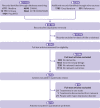Comparative efficacy of interventions for reducing symptoms of depression in people with dementia: systematic review and network meta-analysis
- PMID: 33762262
- PMCID: PMC7988455
- DOI: 10.1136/bmj.n532
Comparative efficacy of interventions for reducing symptoms of depression in people with dementia: systematic review and network meta-analysis
Abstract
Objective: To describe the comparative efficacy of drug and non-drug interventions for reducing symptoms of depression in people with dementia who experience depression as a neuropsychiatric symptom of dementia or have a diagnosis of a major depressive disorder.
Design: Systematic review and meta-analysis.
Data sources: Medline, Embase, the Cochrane Library, CINAHL, PsycINFO, and grey literature between inception and 15 October 2020.
Eligibility criteria for study selection: Randomised trials comparing drug or non-drug interventions with usual care or any other intervention targeting symptoms of depression in people with dementia.
Main outcome measures: Pairs of reviewers screened studies, abstracted aggregate level data, and appraised risk of bias with the Cochrane risk of bias tool, which facilitated the derivation of standardised mean differences and back transformed mean differences (on the Cornell scale for depression in dementia) from bayesian random effects network meta-analyses and pairwise meta-analyses.
Results: Of 22 138 citations screened, 256 studies (28 483 people with dementia) were included. Missing data posed the greatest risk to review findings. In the network meta-analysis of studies including people with dementia without a diagnosis of a major depressive disorder who were experiencing symptoms of depression (213 studies; 25 177 people with dementia; between study variance 0.23), seven interventions were associated with a greater reduction in symptoms of depression compared with usual care: cognitive stimulation (mean difference -2.93, 95% credible interval -4.35 to -1.52), cognitive stimulation combined with a cholinesterase inhibitor (-11.39, -18.38 to -3.93), massage and touch therapy (-9.03, -12.28 to -5.88), multidisciplinary care (-1.98, -3.80 to -0.16), occupational therapy (-2.59, -4.70 to -0.40), exercise combined with social interaction and cognitive stimulation (-12.37, -19.01 to -5.36), and reminiscence therapy (-2.30, -3.68 to -0.93). Except for massage and touch therapy, cognitive stimulation combined with a cholinesterase inhibitor, and cognitive stimulation combined with exercise and social interaction, which were more efficacious than some drug interventions, no statistically significant difference was found in the comparative efficacy of drug and non-drug interventions for reducing symptoms of depression in people with dementia without a diagnosis of a major depressive disorder. Clinical and methodological heterogeneity precluded network meta-analysis of studies comparing the efficacy of interventions specifically for reducing symptoms of depression in people with dementia and a major depressive disorder (22 studies; 1829 patients).
Conclusions: In this systematic review, non-drug interventions were found to be more efficacious than drug interventions for reducing symptoms of depression in people with dementia without a major depressive disorder.
Systematic review registration: PROSPERO CRD42017050130.
© Author(s) (or their employer(s)) 2019. Re-use permitted under CC BY-NC. No commercial re-use. See rights and permissions. Published by BMJ.
Conflict of interest statement
Competing interests: All authors have completed the ICMJE uniform disclosure form at www.icmje.org/coi_disclosure.pdf and declare: support from the Alberta Critical Care Strategic Clinical Network; no financial relationships with any organisations that might have an interest in the submitted work in the previous three years; no other relationships or activities that could appear to have influenced the submitted work. ACT is funded by a tier 2 Canada research chair in Knowledge Synthesis. SES is funded by a tier 1 Canada research chair in knowledge translation. AAV is funded by a European Union’s Horizon 2020 grant (No 754936).
Figures



Comment in
-
In patients with dementia and depression, several nondrug interventions vs. usual care reduce depression symptoms.Ann Intern Med. 2021 Aug;174(8):JC89. doi: 10.7326/ACPJ202108170-089. Epub 2021 Aug 3. Ann Intern Med. 2021. PMID: 34339230
References
-
- World Alzheimer Report 2018. London; 2018.
Publication types
MeSH terms
Substances
LinkOut - more resources
Full Text Sources
Other Literature Sources
Medical
